HOME > Basketball
NBA Star Profile—Dennis Rodman
10:59am, 27 October 2025【Basketball】
1. From a substitute rookie to a core member of the championship, his top defensive and rebounding abilities began to show
· 1986-87 season: A substitute who first entered the league: Rodman mainly served as a substitute for the Pistons, averaging about 15 minutes per game. Although the statistics are not outstanding, he showed his defensive effort and potential in his limited playing time.
· 1987-88 season: Emerging defensive talent: Rodman's defensive ability began to attract attention this season. He was entrusted with important tasks in the playoffs, focusing on defending the Celtics' number one star Larry Bird, and achieved good results. The scene where he ran all over the field to save the ball has also become one of his trademarks.
· 1988-90 season: Championship core and defensive champion: Rodman became the team's starter in these two seasons, and his defense became a key part of the Pistons' "Bad Boys" suffocating defensive system. He helped the team win two consecutive NBA championships in 1989 and 1990. In 1990, he won the Defensive Player of the Year and was selected for the All-Star Game. His defensive ability was recognized.
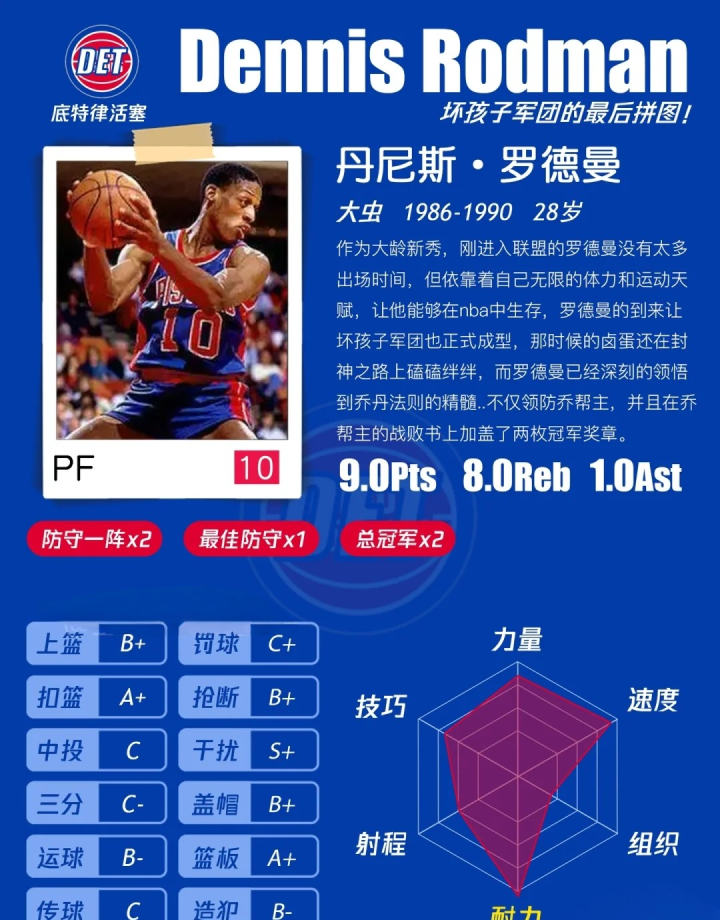
Rodman Files
2. Completed the transformation from a top defensive warrior to a historical rebounding leader
· 1990-91 season: continuation of the defensive core. Rodman became a full-time starter for the first time this season. His playing time increased and his rebounding data significantly increased to 12.5 rebounds per game. He once again won the Defensive Player of the Year and was selected to the All-Defensive First Team, establishing himself as the league's top defender. The Pistons lost to Jordan's Bulls in the Eastern Conference Finals.
· 1991-92 season: The birth and peak of the rebounding king. This was the year when Rodman's statistics exploded. He increased his rebound average to an astonishing 18.7 rebounds per game, which is the highest rebound average in modern basketball history. With this performance, he won his first rebounding title and was selected to the All-NBA third team. This was one of the few honors he received in the offensive lineup in his career. It is worth mentioning that this season he unexpectedly made 32 three-pointers, demonstrating his overlooked offensive ability in specific situations.
· 1992-93 season: Consolidation of rebounding dominance. Rodman averaged 18.3 rebounds per game and continued to lead the league in rebounding. Although the Pistons' record declined due to factors such as coaching changes and team reconstruction, and they even missed the playoffs, Rodman's performance in rebounding was still impeccable. After the season, the Pistons decided to rebuild and traded Rodman to the San Antonio Spurs.
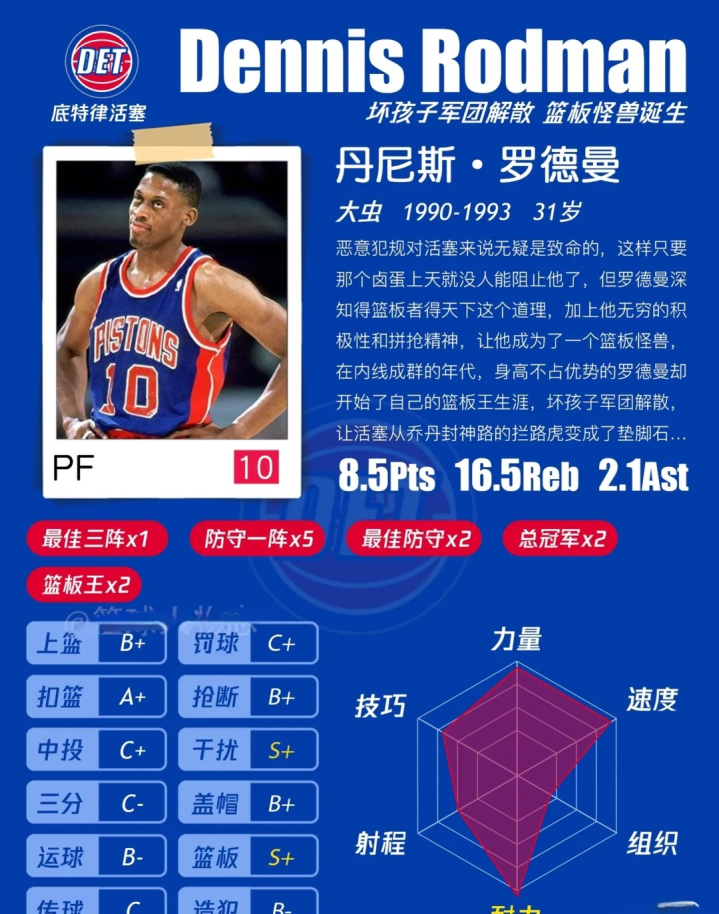
Rodman File
3. From the defensive core of the Detroit Pistons to the rebounding leader of the San Antonio Spurs
· 1993-94 season: Rodman, the cornerstone of the Spurs' rebounding, was traded from the Pistons to the Spurs. He averaged 17.3 rebounds per game and became the rebounding leader that season. Rodman focused on rebounding and defense, allowing team center David Robinson to devote more energy to offense, and eventually won the league's scoring title that season. Rodman was selected to the NBA All-Defensive Second Team that season.
· 1994-95 season: Continuous dominance and contradiction revealed. Rodman continued to reign as the rebounding leader with an average of 16.8 rebounds per game. He helped the Spurs achieve the best record of 62 wins and 20 losses in team history and successfully entered the Western Conference Finals. Although the team ultimately lost to the Houston Rockets led by Olajuwon, Rodman's rebounding contribution was crucial. However, his controversial behavior off the court and conflicts with team management (such as conflicts with then-Spurs general manager Popovich) also gradually surfaced and became the focus of the public.
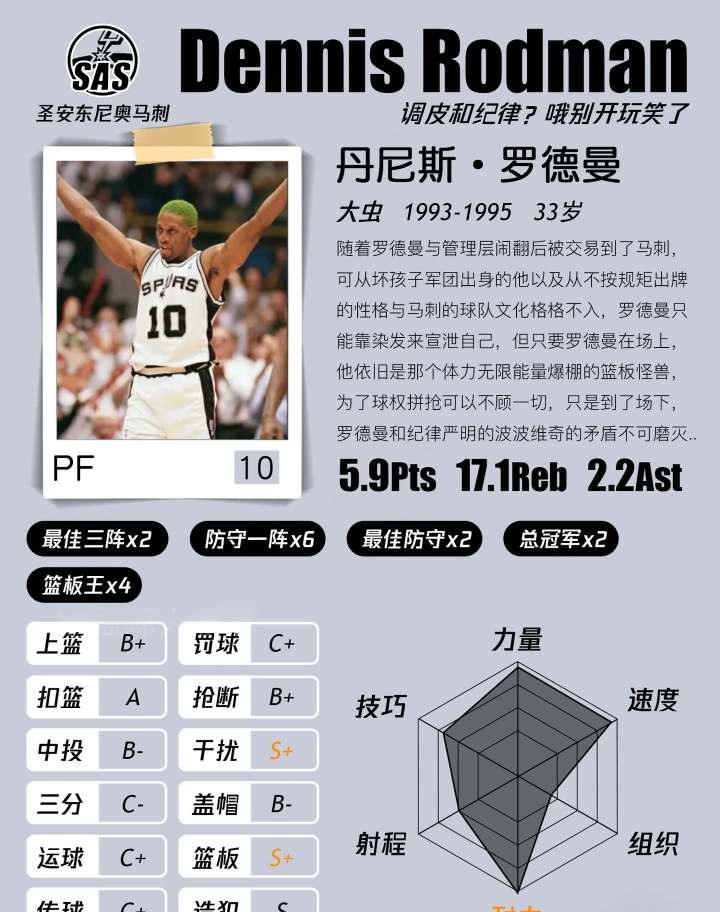
Rodman Files
4. Becoming the defensive cornerstone of the Bulls' dynasty championship
· 1995-96 season: Seamless integration and first championship Rodman transferred from the Spurs to the Bulls and quickly integrated into the team's defensive system. He focused on rebounding and defense. He averaged 14.9 rebounds per game that season, became the rebounding leader, and was selected to the All-Defensive First Team. In the finals against the Sonics, his defense of "Rain Man" Sean Kemp and control of rebounds (averaging 14.7 rebounds per game in the playoffs) provided key support for the Bulls to win the championship.
· 1996-97 season: Rebounding performance reached its peak During the regular season, the 36-year-old Rodman averaged 16.1 rebounds per game, winning the rebounding title again. Although Rodman faced greater pressure on the defensive end when facing the Jazz's Karl Malone in the Finals, he still contributed to the team through active fighting and rebounding, helping the Bulls successfully defend their title.
· 1997-98 season: The oldest rebounding leader and the last dance. In this season, Rodman once again became the rebounding leader with an average of 15.0 rebounds per game. At the same time, at the age of 36 years and 341 days, he became the oldest rebounding leader in NBA history. In the playoffs, he continued to provide rebounding support for the team. With Jordan's "last shot", Rodman also won his third Bulls championship ring with the Bulls.
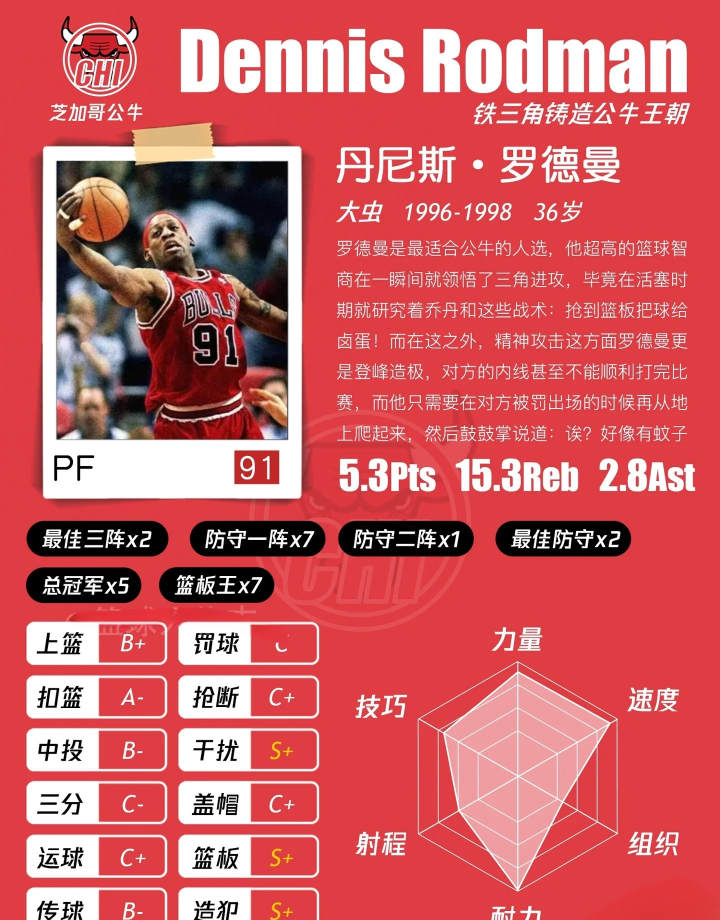
Rodman Files
5. The hero is getting older in his twilight years
· 1998-99 season: Los Angeles Lakers stayed briefly. Rodman joined the Los Angeles Lakers in 1999. Although he still averaged 11.2 rebounds per game, showing his ability in rebounding, his off-court problems and his integration with the team were not ideal, which ultimately led to him being waived by the Lakers after playing only 23 games.
· 1999-00 season: At the end of his Dallas Mavericks career, Rodman joined the Dallas Mavericks (Dallas Mavericks) in the 1999-00 season. Although he still averaged 14.3 rebounds per game in 12 limited games, his off-court troubles continued. On March 8, 2000, Rodman announced his retirement from the NBA, ending his controversial but accomplished NBA career..
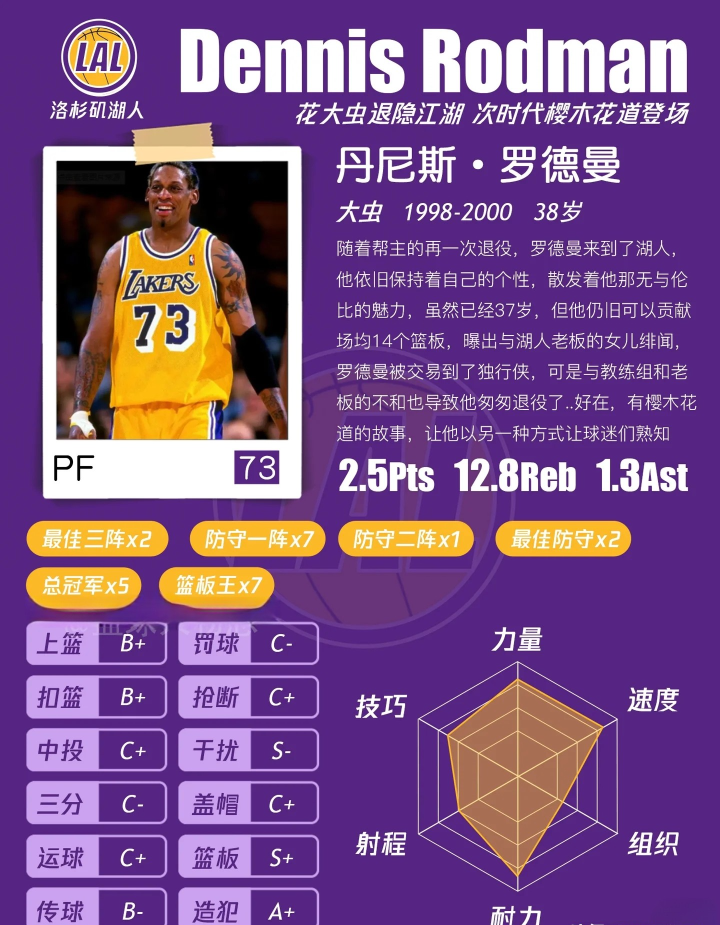
Rodman Files
Looking back on Rodman's career, he won the NBA championship 5 times (1989, 1990, 1996, 1997, 1998), was selected to the NBA All-Star team twice (1990, 1992), and was awarded the NBA Defensive Player of the Year twice (1990, 1991), and set a record of winning the NBA rebounding title for seven consecutive years (1992-1998), grabbing a total of 11,954 rebounds in his career. His No. 10 jersey has been retired by the Detroit Pistons and he was inducted into the Naismith Memorial Basketball Hall of Fame in 2011, all of which confirm his unique position in basketball history.
Related Posts
- Wenban Yama s latest figure! Crazy transformation!
- A flash in the pan! The regret of the first generation of white horse spear!
- European Cup sad and happy night: Four teams qualify for three consecutive victories, and Doncic still finds a victory for 39+9
- Lakers news: James creates another miracle, Doncic polishes his weaknesses, American News suggests Sohawikins
- Very dissatisfied with the progress of the negotiations. The 76ers star in the backcourt may choose to sign a qualification offer?
- Analysis of Yang Hansen s second game performance in the summer league: Pros and cons are revealed
- Harden s 81.5 million details in two years: Keep the full middle class for the Clippers and no maximum salary after leaving the Rockets
- The top 50 players in the NBA s lowest winning rate are & No. 4 pick is shortlisted, the regicide is listed, and the number one declining god is only 20%
- Chalmos: James insists on physical therapy in nightclubs, so he has never been seriously injured
- Edwards continues to play in the G2 battle, the three best players in the 12 years of Oxford!
Hot Posts
- Wenban Yama s latest figure! Crazy transformation!
- A flash in the pan! The regret of the first generation of white horse spear!
- European Cup sad and happy night: Four teams qualify for three consecutive victories, and Doncic still finds a victory for 39+9
- Lakers news: James creates another miracle, Doncic polishes his weaknesses, American News suggests Sohawikins
Recommend
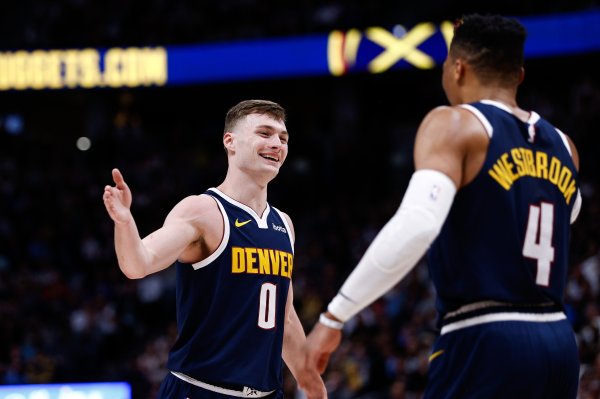
Kenny Smith: The Clippers plan to put Braun and Westbrook open, but both of them throw the ball into the
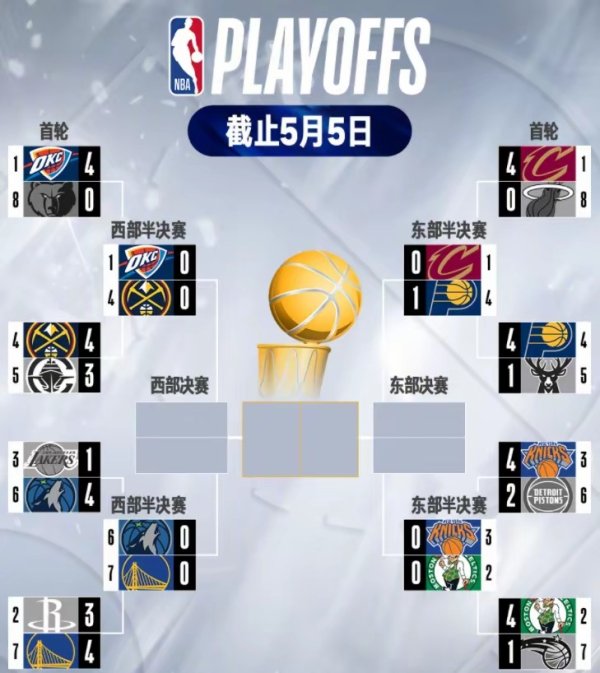
Curry tied the seventh battle for the gods! 37-year-old hit 30+ set the oldest record. Warriors boss: He redefines greatness

Confirmed! The signing was reached, the 820 million group of giants set a record, the NBA championship is about to break up the team

Locking the 14-man roster, the Lakers enter the Doncic era! Team record reveals James transformation into defense and no ball
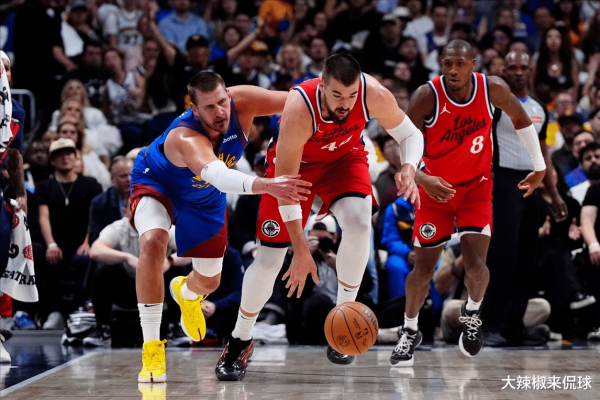
The Western Conference fell with a bang, the Clippers didn t wait, Harden vaguely, only one person stood and lost
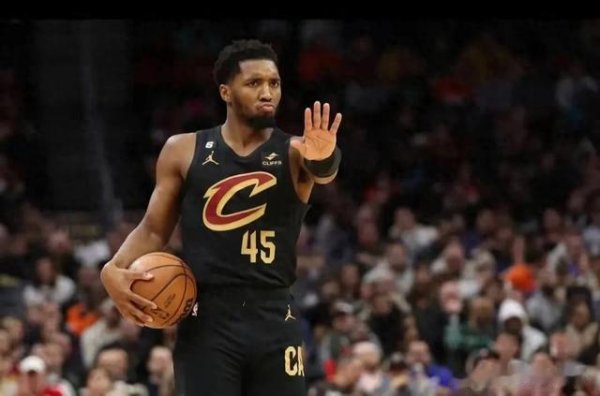
Mitchell is the same as Harden, he can t play in high-end games, he will be very good at the playoffs and will lose his chains later.

Haslem: Ayton always wants to shoot his distance. He won t have the ball right.
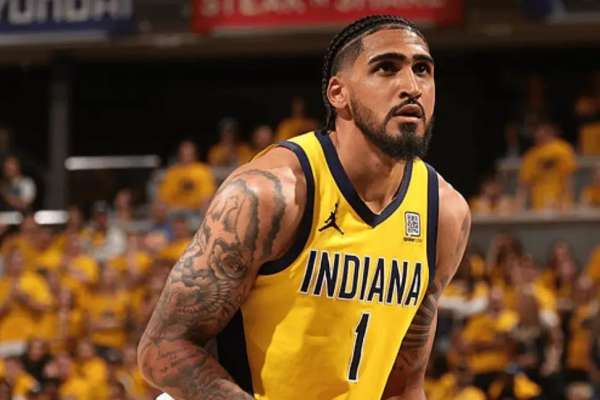
Obitopin – The evolution of the dunk champion